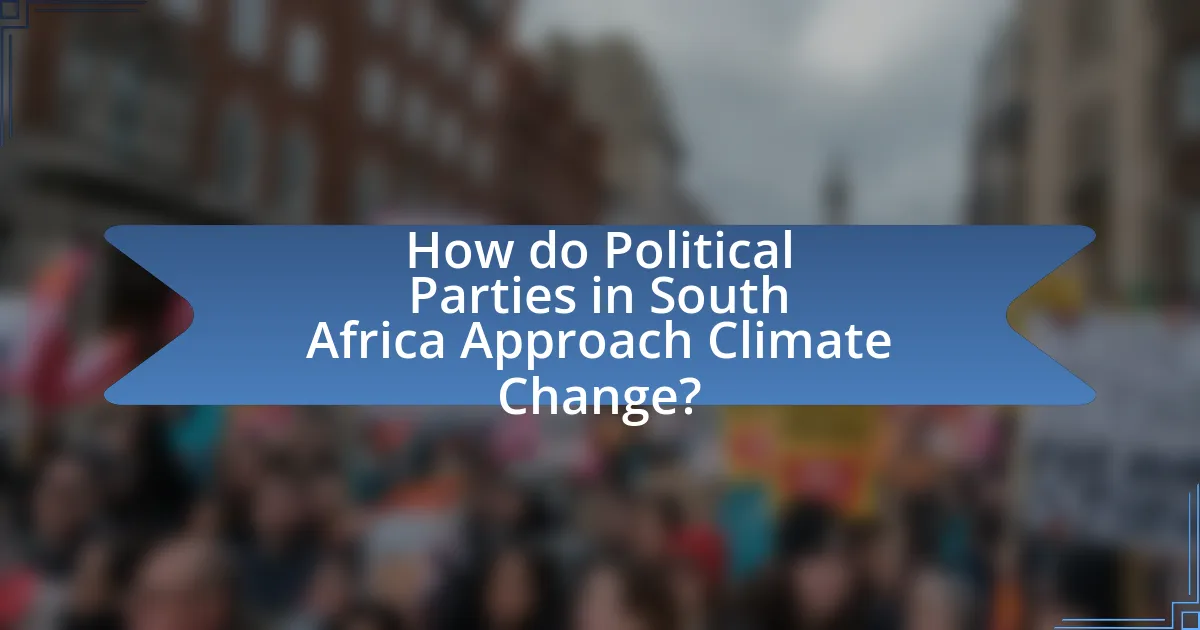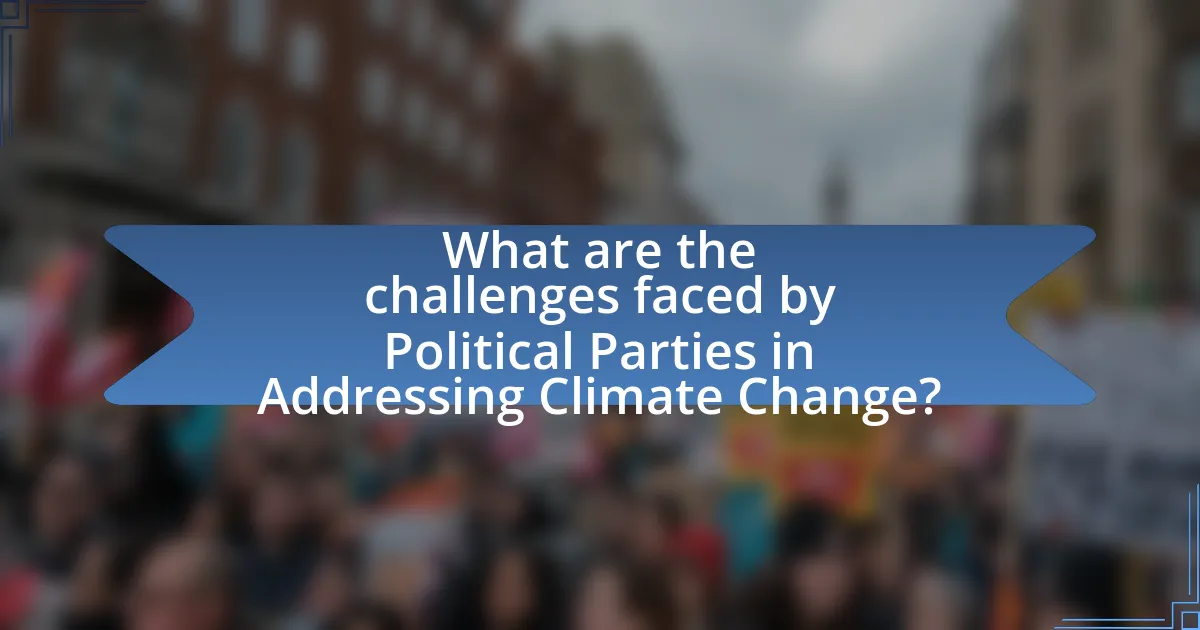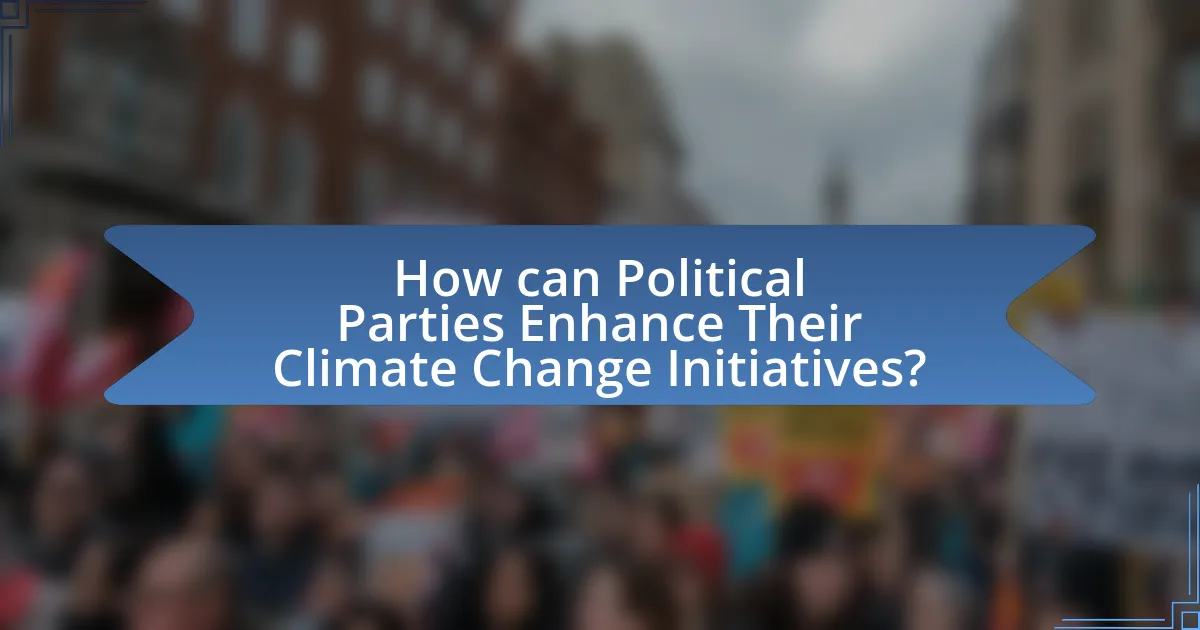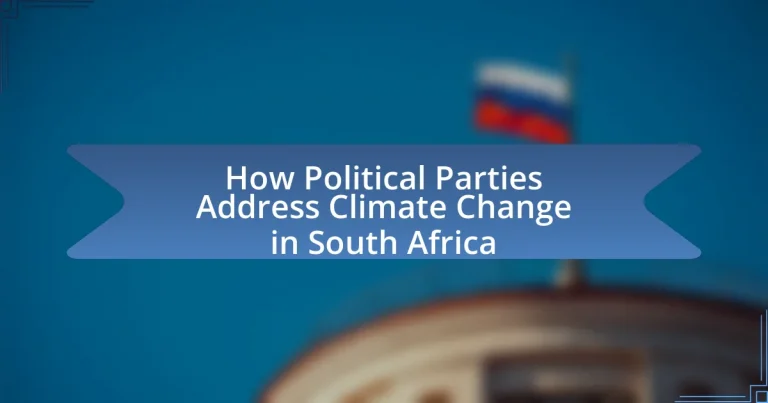The article examines how political parties in South Africa, specifically the African National Congress (ANC), Democratic Alliance (DA), and Economic Freedom Fighters (EFF), approach climate change through various policy proposals and legislative initiatives. It highlights the differing ideologies of these parties, their historical contexts, and the socio-economic impacts of climate change on the nation. Additionally, the article discusses the influence of public opinion, internal party dynamics, and external factors on climate policies, as well as strategies for enhancing climate action and the potential benefits of stronger environmental policies for political parties.

How do Political Parties in South Africa Approach Climate Change?
Political parties in South Africa approach climate change through a mix of policy proposals, advocacy, and legislative initiatives. The African National Congress (ANC) emphasizes a just transition to a low-carbon economy, focusing on renewable energy and sustainable development, as outlined in their National Development Plan. The Democratic Alliance (DA) advocates for market-driven solutions and increased investment in green technologies, promoting accountability in environmental governance. The Economic Freedom Fighters (EFF) prioritize radical reforms, including nationalization of resources to address climate injustices and promote environmental sustainability. These approaches reflect the parties’ differing ideologies and priorities, with each party proposing specific measures to combat climate change while considering economic and social implications.
What are the key political parties involved in climate change policy?
The key political parties involved in climate change policy in South Africa are the African National Congress (ANC), the Democratic Alliance (DA), and the Economic Freedom Fighters (EFF). The ANC, as the ruling party, has implemented various climate policies, including the National Development Plan, which emphasizes sustainable development. The DA advocates for renewable energy and has criticized the government’s reliance on coal. The EFF focuses on environmental justice and aims to address climate change through radical economic transformation. These parties influence climate policy through their platforms and legislative actions, reflecting their differing approaches to environmental issues.
How do these parties define their stance on climate change?
Political parties in South Africa define their stance on climate change through varying commitments to environmental policies and sustainability initiatives. The African National Congress (ANC) emphasizes a just transition to a low-carbon economy, advocating for renewable energy and sustainable development as part of its broader economic strategy. The Democratic Alliance (DA) prioritizes accountability and transparency in environmental governance, promoting policies that support clean energy and climate resilience. The Economic Freedom Fighters (EFF) focus on radical economic transformation, linking climate action to social justice and advocating for state-led initiatives to combat climate change. Each party’s stance reflects its ideological framework and policy priorities, influencing their proposed solutions to climate challenges.
What historical context influences their current positions?
The historical context influencing the current positions of political parties in South Africa regarding climate change includes the legacy of apartheid, economic disparities, and environmental injustices. The apartheid regime’s policies prioritized industrial growth over environmental sustainability, leading to significant ecological degradation and social inequities. Post-apartheid, political parties have had to navigate these historical injustices while addressing climate change, often reflecting the interests of marginalized communities disproportionately affected by environmental issues. For instance, the African National Congress has focused on integrating climate policies with social justice, while opposition parties emphasize economic growth and energy security, shaped by historical economic inequalities. This complex interplay of historical factors continues to shape party platforms and public discourse on climate change in South Africa.
Why is climate change a critical issue for South African political parties?
Climate change is a critical issue for South African political parties because it directly impacts the country’s economy, social stability, and environmental sustainability. The nation faces severe climate-related challenges, such as droughts and flooding, which threaten agricultural productivity and water resources. According to the South African National Biodiversity Institute, climate change could reduce crop yields by up to 30% by 2030, exacerbating food insecurity and economic instability. Political parties must address these issues to align with public concerns and international commitments, such as the Paris Agreement, which South Africa ratified in 2016. Failure to prioritize climate change could lead to political backlash and loss of voter support, making it essential for parties to integrate climate policies into their platforms.
What are the socio-economic impacts of climate change in South Africa?
Climate change in South Africa significantly impacts socio-economic conditions, primarily through increased droughts, flooding, and temperature extremes. These climatic changes threaten agricultural productivity, which is vital for food security and the economy, as agriculture contributes approximately 2.6% to the national GDP and employs around 10% of the workforce. Additionally, climate change exacerbates water scarcity, affecting both urban and rural communities, leading to increased competition for resources and potential conflicts. The World Bank estimates that climate change could push an additional 1.5 million South Africans into poverty by 2030, highlighting the urgent need for adaptive measures. Furthermore, health issues related to climate change, such as heat-related illnesses and vector-borne diseases, strain public health systems and increase healthcare costs, further burdening the economy.
How does public opinion shape party policies on climate change?
Public opinion significantly influences party policies on climate change by compelling political parties to align their platforms with the views and concerns of their constituents. In South Africa, where public awareness of climate issues has increased, parties often adjust their policies to reflect the growing demand for sustainable practices and environmental protection. For instance, surveys indicate that a majority of South Africans prioritize climate action, prompting parties to incorporate climate change initiatives into their manifestos to attract voters. This responsiveness to public sentiment is evident in the policy shifts observed in major parties, such as the African National Congress and the Democratic Alliance, which have both emphasized climate resilience and sustainable development in recent years.
What strategies do political parties propose to combat climate change?
Political parties in South Africa propose various strategies to combat climate change, including transitioning to renewable energy, implementing carbon pricing, and enhancing climate resilience in communities. The African National Congress (ANC) emphasizes a shift towards renewable energy sources, aiming for 100% renewable energy by 2050, as outlined in their Integrated Resource Plan. The Democratic Alliance (DA) advocates for market-driven solutions, promoting investment in green technologies and infrastructure. The Economic Freedom Fighters (EFF) propose nationalizing energy resources to ensure equitable access to clean energy. Additionally, parties emphasize the importance of international cooperation and adherence to global climate agreements, such as the Paris Agreement, to effectively address climate change challenges.
What legislative measures are being considered or implemented?
Legislative measures being considered or implemented in South Africa to address climate change include the Climate Change Bill, which aims to establish a legal framework for climate action and set emission reduction targets. Additionally, the National Climate Change Adaptation Strategy is being developed to enhance resilience against climate impacts. These measures are part of South Africa’s commitment to the Paris Agreement, which requires countries to take action to limit global warming. The government has also proposed the Renewable Energy Independent Power Producer Procurement Programme to increase the share of renewable energy in the national grid, supporting the transition to a low-carbon economy.
How do parties plan to engage with international climate agreements?
Parties in South Africa plan to engage with international climate agreements by committing to the goals set forth in the Paris Agreement, which aims to limit global warming to well below 2 degrees Celsius. This engagement includes developing national climate action plans, known as Nationally Determined Contributions (NDCs), that outline specific targets for reducing greenhouse gas emissions. For instance, the South African government has pledged to reduce emissions by 34% by 2020 and 42% by 2025, contingent on international support. Additionally, political parties are expected to participate in global climate negotiations, such as the annual Conference of the Parties (COP), to advocate for financial and technological support from developed nations, ensuring that their commitments align with international standards and scientific recommendations.

What are the challenges faced by Political Parties in Addressing Climate Change?
Political parties in South Africa face several challenges in addressing climate change, including political fragmentation, limited resources, and public skepticism. Political fragmentation leads to diverse agendas that can hinder unified climate action, as parties prioritize their own interests over collective environmental goals. Limited resources restrict the ability of parties to implement comprehensive climate policies, as funding for initiatives often competes with other pressing social issues. Additionally, public skepticism about climate change impacts the political will to enact necessary legislation, as parties may fear backlash from constituents who do not prioritize environmental concerns. These challenges complicate the formulation and execution of effective climate strategies within the political landscape of South Africa.
What internal party dynamics affect climate change policies?
Internal party dynamics significantly influence climate change policies in South Africa. These dynamics include ideological divisions, leadership priorities, and factional interests within political parties. For instance, parties may experience conflicts between members advocating for aggressive climate action and those prioritizing economic growth or job preservation, which can lead to diluted policy proposals. Additionally, the leadership’s stance on climate issues can shape the party’s overall approach, as seen in the African National Congress, where varying views on climate change have led to inconsistent policy frameworks. Furthermore, factionalism can result in competing agendas that complicate consensus-building on climate initiatives, ultimately affecting the effectiveness and coherence of climate policies.
How do differing ideologies within parties impact climate action?
Differing ideologies within political parties significantly impact climate action by shaping policy priorities and approaches to environmental issues. For instance, parties with a strong emphasis on economic growth may prioritize industrial development over environmental regulations, leading to weaker climate policies. In contrast, parties that advocate for social justice and environmental sustainability often push for more aggressive climate action, such as renewable energy investments and stricter emissions targets. This ideological divide can be observed in South Africa, where the African National Congress has historically balanced economic growth with environmental concerns, while the Economic Freedom Fighters emphasize radical economic transformation, which may overlook environmental sustainability. Research indicates that these ideological differences can lead to inconsistent climate policies and hinder cohesive national strategies for addressing climate change.
What role do party leaders play in shaping climate agendas?
Party leaders play a crucial role in shaping climate agendas by influencing policy direction, mobilizing party members, and representing party positions in public discourse. They set the priorities for climate action within their parties, often determining the extent to which climate change is integrated into broader political platforms. For instance, in South Africa, party leaders like the President of the African National Congress have significant sway over national climate policies, as seen in the commitment to the Paris Agreement and the establishment of the Presidential Climate Commission. Their leadership can drive legislative initiatives, secure funding for climate projects, and foster collaboration among various stakeholders, thereby directly impacting the effectiveness of climate strategies in the country.
What external factors hinder effective climate change action?
External factors that hinder effective climate change action include economic constraints, political instability, and international relations. Economic constraints, such as limited funding for green initiatives, restrict the ability of governments and organizations to implement necessary climate policies. Political instability can lead to inconsistent climate policies, as changing administrations may prioritize short-term economic gains over long-term environmental goals. Additionally, international relations, particularly in terms of trade agreements and diplomatic ties, can affect a country’s commitment to climate action, as nations may prioritize economic partnerships over environmental responsibilities. For instance, South Africa’s reliance on coal for energy production is influenced by both domestic economic needs and international market dynamics, which complicates the transition to renewable energy sources.
How do economic interests conflict with environmental policies?
Economic interests often conflict with environmental policies due to the prioritization of short-term financial gains over long-term ecological sustainability. For instance, industries such as mining and fossil fuels contribute significantly to South Africa’s economy, providing jobs and revenue, but they also lead to environmental degradation and pollution. According to the South African Department of Environmental Affairs, mining activities have resulted in severe land degradation and water contamination, which contradicts the goals of environmental policies aimed at conservation and sustainability. This tension between economic development and environmental protection creates challenges for political parties in formulating effective climate change strategies.
What influence do lobby groups have on party positions?
Lobby groups significantly influence party positions by shaping policy agendas and swaying political discourse. These groups often represent specific interests, such as environmental advocacy, and utilize strategies like funding campaigns, mobilizing grassroots support, and providing research to persuade political parties to adopt favorable stances. For instance, in South Africa, organizations focused on climate change have successfully pressured parties to prioritize sustainable policies, evidenced by the increased inclusion of climate action in party manifestos and legislative proposals. This demonstrates the tangible impact lobby groups have on aligning party positions with specific interest-driven agendas.

How can Political Parties Enhance Their Climate Change Initiatives?
Political parties can enhance their climate change initiatives by integrating comprehensive environmental policies into their platforms and actively engaging with stakeholders. This approach ensures that climate action is prioritized in legislative agendas and public discourse. For instance, the African National Congress (ANC) has committed to reducing greenhouse gas emissions by 34% by 2020, demonstrating a concrete target that can mobilize support and accountability. Additionally, political parties can collaborate with scientific communities to base their policies on empirical data, as seen in the South African government’s reliance on the National Development Plan, which emphasizes sustainable development. Engaging citizens through awareness campaigns and participatory governance can further strengthen these initiatives, as public support is crucial for effective climate action.
What best practices can political parties adopt for effective climate action?
Political parties can adopt several best practices for effective climate action, including integrating climate policies into their core platforms, engaging with scientific communities, and fostering public awareness campaigns. By prioritizing climate change in their agendas, parties can ensure that environmental issues are addressed at the highest levels of governance. Engaging with scientists allows parties to base their policies on credible research, which enhances the effectiveness of proposed solutions. Additionally, public awareness campaigns can mobilize citizens to support climate initiatives, creating a more informed electorate that demands action. These practices are essential for building a comprehensive approach to climate change that resonates with the public and drives meaningful policy changes.
How can parties improve collaboration with environmental organizations?
Parties can improve collaboration with environmental organizations by establishing formal partnerships that include shared goals and resources. This approach allows for coordinated efforts in addressing climate change, as evidenced by successful collaborations in various regions where political entities and environmental groups have jointly developed policies that reflect mutual interests. For instance, in South Africa, the collaboration between the government and organizations like WWF South Africa has led to initiatives that promote sustainable practices and biodiversity conservation, demonstrating the effectiveness of such partnerships in achieving environmental objectives.
What role does grassroots activism play in shaping party policies?
Grassroots activism plays a crucial role in shaping party policies by mobilizing community support and influencing political agendas. This form of activism often highlights local issues, such as climate change, that may be overlooked by mainstream political discourse. For instance, in South Africa, grassroots movements like the Climate Justice Coalition have successfully pressured political parties to adopt more ambitious climate policies, demonstrating the power of collective action in advocating for environmental justice. Research indicates that grassroots efforts can lead to significant policy changes, as seen in the increased commitment to renewable energy initiatives by various political parties in response to public demand.
What are the potential benefits of stronger climate policies for political parties?
Stronger climate policies can enhance political parties’ public image and voter support. By committing to robust climate action, parties can attract environmentally conscious voters, particularly younger demographics who prioritize sustainability. For instance, a 2021 survey by the Pew Research Center indicated that 70% of young voters in South Africa view climate change as a critical issue, suggesting that parties advocating for stronger policies may gain electoral advantages. Additionally, implementing effective climate policies can lead to economic opportunities, such as job creation in renewable energy sectors, further solidifying a party’s appeal among constituents concerned about economic growth and environmental sustainability.
How can addressing climate change enhance party popularity?
Addressing climate change can enhance party popularity by aligning political agendas with the growing public concern for environmental issues. In South Africa, where climate change impacts such as droughts and extreme weather events are increasingly evident, parties that prioritize sustainable policies resonate with voters. For instance, a 2021 survey by the South African Institute of Race Relations indicated that 70% of South Africans view climate change as a significant threat, suggesting that parties advocating for climate action can attract a larger voter base. By implementing effective climate policies, parties not only demonstrate responsiveness to public concerns but also position themselves as leaders in a critical global issue, thereby increasing their appeal and electoral success.
What long-term advantages do sustainable policies offer to parties?
Sustainable policies offer political parties long-term advantages such as enhanced public support, improved economic resilience, and alignment with global environmental standards. By adopting sustainable practices, parties can attract environmentally conscious voters, thereby increasing their electoral base. Additionally, sustainable policies can lead to cost savings through energy efficiency and waste reduction, which strengthens economic stability. Furthermore, aligning with international sustainability goals can enhance a party’s reputation on the global stage, fostering partnerships and investment opportunities. These advantages are supported by studies indicating that parties prioritizing sustainability often experience increased voter loyalty and engagement, as seen in various electoral outcomes worldwide.
What practical steps can political parties take to engage the public on climate issues?
Political parties can engage the public on climate issues by implementing community outreach programs, hosting public forums, and utilizing social media campaigns. Community outreach programs allow parties to educate citizens about climate change impacts and solutions, fostering a sense of urgency and involvement. Public forums provide a platform for dialogue, enabling citizens to voice concerns and ask questions, which can enhance trust and transparency. Social media campaigns can effectively disseminate information and mobilize support, as studies show that 69% of adults in South Africa use social media, making it a powerful tool for engagement. These steps not only inform the public but also encourage active participation in climate initiatives.


